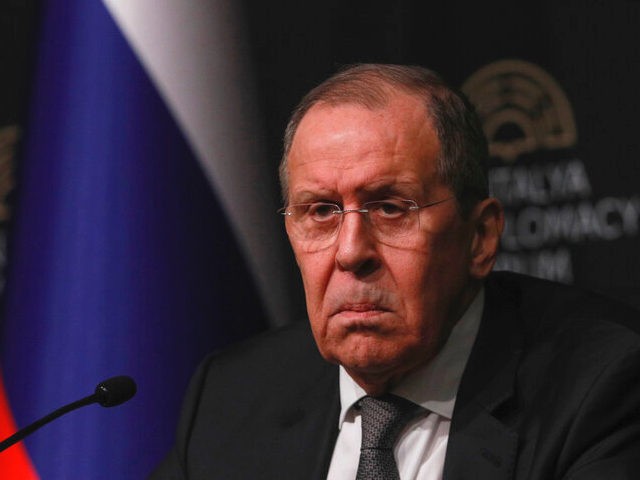Russian Foreign Minister Sergey Lavrov declared that Russia had “not invaded Ukraine” and had no “plan to invade other countries,” following yet another round of failed peace talks between his country and Ukraine on Thursday.
The Russian government, under leader Vladimir Putin, invaded and colonized Ukraine’s Crimean peninsula in 2014, formally annexing the region into the country. Russia, extensive evidence has revealed since, has supported an insurgency in Ukraine’s eastern Donbas region, arming and encouraging separatists there to fight against the Ukrainian military. Russia denies any role in Donbas but formally “annexed” Crimea in 2014, shortly after the fall of pro-Russian President Viktor Yanukovych after months of pro-democracy protests.
More recently, in February, Putin announced that he would recognize Donbas as consisting of two sovereign states, the Donetsk and Luhansk “People’s Republics,” and that those two “countries” had requested Russian military assistance to fight Ukraine. Putin ordered a full-scale military assault that continues to this day, focusing significantly on capturing territory far from Donbas, including the capital, Kyiv, which is about 500 miles from both Donetsk and Luhansk.
During his speech announcing the recognition of Donetsk and Luhansk, Putin asserted that “modern Ukraine was completely created by Russia” and “has never had stable traditions of their own statehood.”
As a result of the operation, Russia has occupied strategic locations throughout the country, including several nuclear power plants.
Lavrov rejected the description of any of this behavior as an “invasion” on Thursday.
“As for your question about whether we plan to invade other countries, we have no plans to invade other countries,” Lavrov told reporters, according to the Russian outlet Tass. “We have not invaded Ukraine either. In Ukraine, we are simply … we have explained it many times. The situation that develops there poses direct threats to Russia’s security.”
Lavrov claimed that Russian officials had evidence that Ukraine “plotted” an attack on Russian-backed separatists in Donetsk and Luhansk shortly before the Russian invasion. The situation in Donbas is a war with active hostilities on both sides; Lavrov did not explain how this allegation differed from the regular attacks on both sides that have been ongoing for eight years.
Lavrov made the remarks in Antalya, Turkey, where he traveled to meet with Ukrainian Foreign Minister Dmitry Kuleba for talks that resulted, like all other talks since last month, in no significant developments. Turkey is a NATO country with close ties to Russia – close enough to regularly alarm other NATO members – making it an acceptable venue for talks for both parties.
🇷🇺🇹🇷🇺 In #Antalya, Russian Foreign Minister Sergey #Lavrov holds a meeting with Turkish Foreign Minister Mevlüt Çavuşoğlu and Ukrainian Foreign Minister Dmitry #Kuleba pic.twitter.com/tlSWBBCXuQ
— MFA Russia 🇷🇺 (@mfa_russia) March 10, 2022
While agreeing to meet Kuleba in Turkey, Lavrov insisted that Russia prefers Belarus, a longtime Russian ally and antagonistic state to Ukraine, as a venue for discussions of the war.
“Today’s conversation confirmed that [the Belarusian] track [for negotiations] has no alternatives,” Lavrov claimed in Turkey, according to Russian media outlet Sputnik. “We act based on the premise that these contacts will not be used to replace or devalue the real main negotiating track that is developing on Belarusian territory – something that our colleagues, mostly Ukrainian, do routinely.”
The Antalya talks resulted in no agreements. Speaking to reports, Kuleba asserted that he traveled to Turkey with the express purpose of negotiating a humanitarian ceasefire in Mariupol, a city of nearly half a million people that Russia has heavily assaulted.
“I came here for humanitarian purposes so that to leave the meeting with a decision on establishing a humanitarian corridor to and from Mariupol,” Kuleba said following the talks. “From Mariupol – for civilians who want to leave the place of fear and fighting, and a humanitarian corridor – for providing humanitarian aid to Mariupol.”
“Unfortunately, Minister Lavrov was not able to assume these commitments, but he will contact the relevant authorities on this issue,” Kuleba said, according to Ukrainian state outlet Ukrinform. Kuleba claimed Lavrov did not have an actual authority to negotiate, rendering the meeting useless. Lavrov, however, told reporters that a ceasefire was “not on the agenda,” according to Russia’s Sputnik.
The Ukrainian government has repeatedly urged Moscow to consider direct talks between Putin and Ukrainian President Volodymyr Zelensky. As the attack began, Zelensky delivered a televised speech addressed to the Russian people in which he claimed he had attempted to call Putin personally.
“Today, I initiated a phone call with the president of the Russian federation. The result was silence,” Zelensky said on February 24.
“I know that they [the Russian state] won’t show my address on Russian TV, but Russian people have to see it. They need to know the truth, and the truth is that it is time to stop now, before it is too late,” Zelensky continued. “And if the Russian leaders don’t want to sit with us behind the table for the sake of peace, maybe they will sit behind the table with you. Do Russians want the war? I would like to know the answer. But the answer depends only on you, citizens of the Russian Federation.”
Zelensky and Putin have met in the past to discuss the eight-year-old invasion, but with minimal results.
“Look, it’s very difficult to negotiate [with Putin] … because he dissects every question into details … and then we begin to even consider every word,” Zelensky lamented after meeting with the Russian president, French President Emmanuel Macron, and German Chancellor Angela Merkel in 2019 – his first in-person meeting with Putin. “Many questions were tackled, and my counterparts have said it is a very good result for a first meeting. But I will be honest — it is very little, I wanted to resolve a larger number of problems.”
“I’m happy,” Putin said of the meeting at the time.

COMMENTS
Please let us know if you're having issues with commenting.